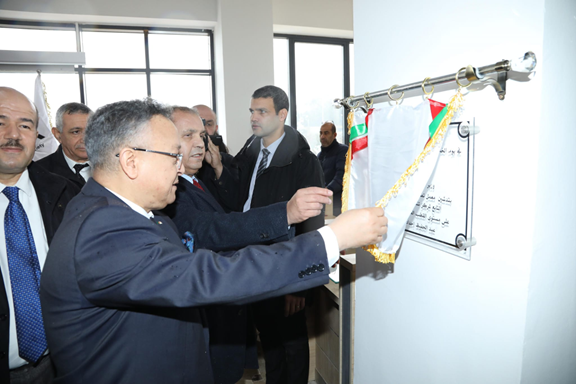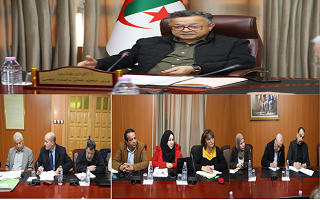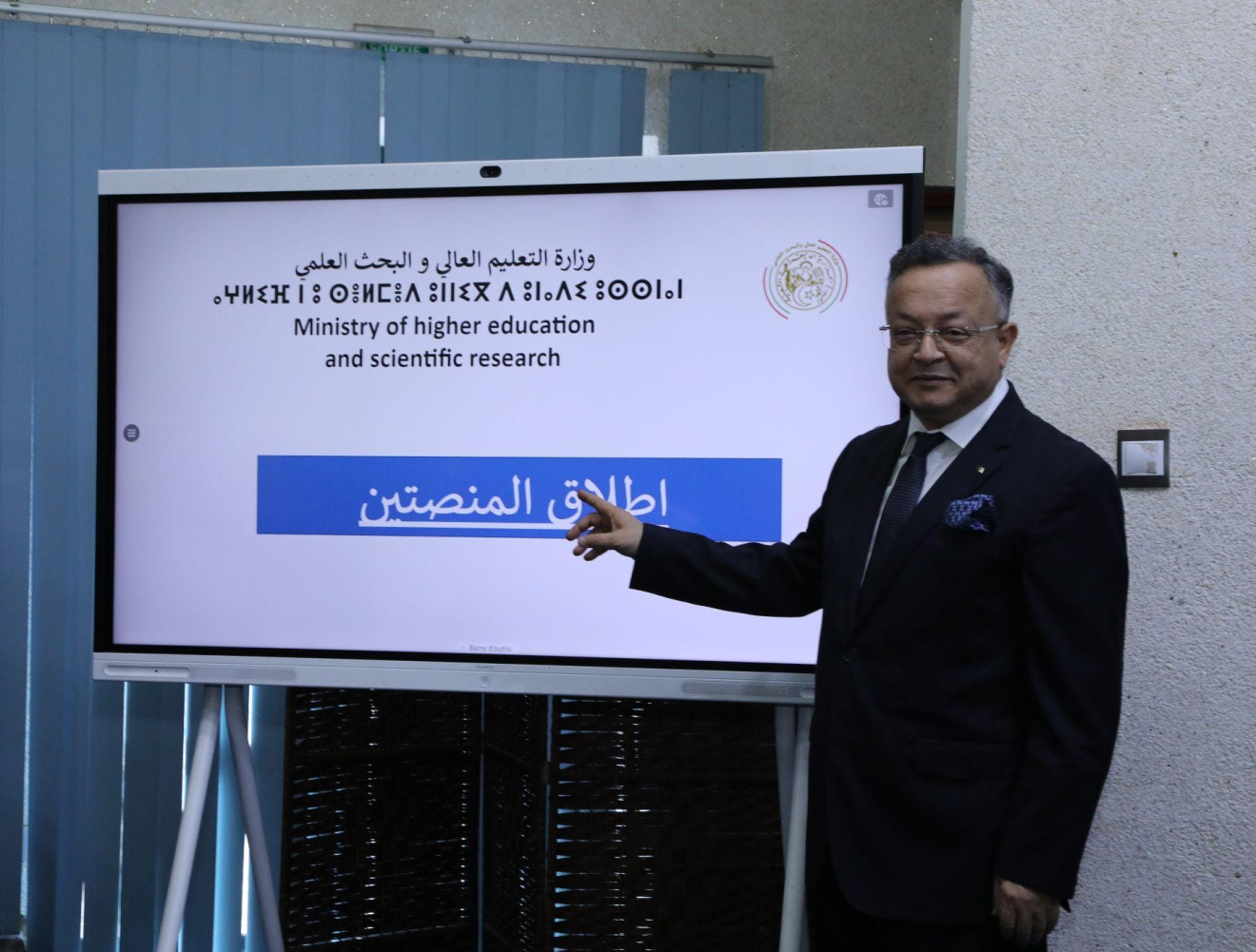Mr. Kamel Baddari holds a national conference on “Algerian University and Development Media” in Algiers 3
ministerial activities
Mr. Kamel Baddari holds a national conference on “Algerian University and Development Media” in Algiers 3
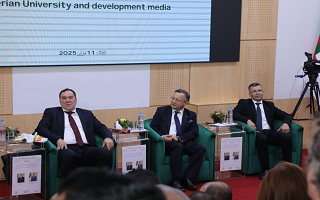
On 11 February 2025, Mr. Kamel Baddari, the Minister of Higher Education and Scientific Research, accompanied by Mr. Mohamed Meziane, the Minister of Communication, chaired a national conference entitled “The Algerian University and Development Media”, organized by the Faculty of Information and Communication Sciences, “Ibrahim Sultan Cheibout” University, Algiers 3. The event was attended by Mr. Omar Rekkache, Director General of the Algerian Agency for Investment Promotion, the representative of the National Union of Algerian Farmers, as well as the directors of public and private media institutions, teachers and media specialists, and students from the National Higher School of Political Science, the Faculty of Information and Communication Sciences and National School of Journalism and Information Sciences.
In his presentation, “Journalism Speciality in the Algerian University: Towards Adapting Training to Development Media and National Challenges”, Mr. Baddari stated that the university “contributes significantly to supporting the integration of graduates in professional life”, and underscored “the economic role of the university through the quality of higher education and scientific research aligning with the needs of society.”
In the same context, he also highlighted the sector’s strategy, which positions scientific research and innovation as a fundamental component of development. Additionally, it engages students in entrepreneurship by creating spaces that facilitate the transformation of their ideas into viable and marketable products.
Mr. Baddari further noted that among the endorsed mechanisms are “the establishment of a network of specialised platforms and the creation of start-ups that provide a framework for idea holders to invest in their concepts.” He stated that it is the same strategy implemented in research centres, where “a policy aimed at enhancing the value of scientific research outcomes has been established, by creating of the prize OF the President of the Republic for innovative researchers, launching over 50 economic projects by transferring scientific research results from the laboratories to the national economy.”
Mr. Kamel Baddari receives His Excellency the Ambassador of the Republic of Hungary
ministerial activities
Mr. Kamel Baddari receives His Excellency the Ambassador of the Republic of Hungary
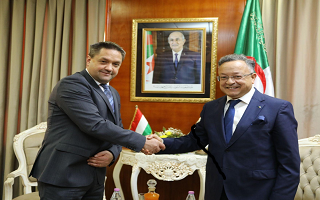
In the context of international cooperation, Mr. Kamel Baddari, the Minister of Higher Education and Scientific Research, welcomed today, February 10th, 2025, His Excellency, Mr. Szarka Gábor Levente, the Hungarian Ambassador to Algeria, at the Ministry’s headquarters. During their meeting, they explored avenues of collaborations and exchange in the domains of higher education and scientific research.
Mr. Kamel Baddari, the Minister of Higher Education and Scientific Research, confirms the sector’s role in executing the President of the Republic’s instructions
ministerial activities
Mr. Kamel Baddari, the Minister of Higher Education and Scientific Research, confirms the sector’s role in executing the President of the Republic’s instructions
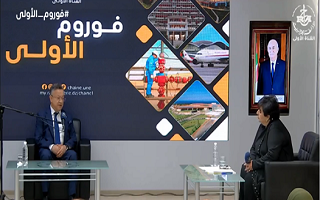
On 10 February 2025, during his appearance on the Forum of Channel 1 of the national radio, Mr. Kamel Baddari, the Minister of Higher Education and Scientific Research, stated that the reforms of the university services mandated by the President of the Republic, are currently monitoring the needs of the students to achieve the outcomes that will be submitted to the government. This endeavour involves the collaborative efforts with the Ministry of Youth, for which committees and workshops have been formed.
Since the university reforms are multidimensional, committees and think tanks are operating within the Inter-Ministerial Committee that bridges Higher Education and the Youth sectors. Their objective is to ensure the provision of adequate services in alignment with the annual budget allocated by the State. This budget must reflects the realities of the ground and attain a notable level students satisfaction. The reforms are crucial not only for enhancing educational and training outcomes, but also for fulfilling the political aim of preparing graduates who are well-equipped with the necessary training, so that each student is at the level of the responsibilities they will assume in the future.
In preparation for the upcoming academic year 2025/2026, the Minister stated that “the objective is to expand the use of English, especially given that 80% of specialties, notably science and technology, are delivered in English, by proficient professors, and therefore, strengthening this aspect is a crucial aim for the next academic year. The necessary subjects will also continue to be supported to elevate the quality of university education, namely, mathematics, computer science, artificial intelligence and software. Furthermore, the Minister of Higher Education added, these subjects will be integrated into the humanities curriculum to ensure uniformity in students’ proficiency across all branches and to enable the humanities and social sciences to contribute to the development of the national economy.”
The Minister pointed out that the University is keeping pace with global technological changes and digitalisation. Consequently, the sector has developed a special program for the years 2024 to 2029, aligned with the President of the Republic’s program, which aims to focus on three strategic axes: improving the quality of higher education and scientific research, prioritising science and mathematics, and establishing the University a pillar of the innovative economy.
He added that the University is opened to the mining sector and to the landscaping of training and higher education in terms of mine engineering and geology across various universities, particularly in regions where mining activities are prevalent. This initiative aims to train specialists who meet the sector’s demands.
The Minister elaborated on the significance of scientific research in stimulating the economy, noting that there are 21 research centres, each associated with a commercial enterprise. This collaboration enables research concepts to be developed and marketed into complete products that benefit the citizens.
Scientific research is dedicated to addressing strategic problems associated with security at all levels, including water, energy and health, particularly as it transitions into the fourth generation stage (4.0), alongside universities of similar calibre. It is anticipated that the distinctive features of Algeria as an emerging country will begin to manifest by 2027, following the outcomes derived from comprehensive training programs, such as the innovative doctoral approach that has directed focus towards essential disciplines that give impetus to the national economy. This is especially pertinent given the transformative impact of entrepreneurship within the academic environment, which has reshaped the vision of the training through the numerous start-ups originating from university institutions within a span of two years. New procedures or agreements concluded with various economic institutions are underway to diversify and modernize this trend, and increase the number of the participants to reach 20,000 start-ups by 2029, in line with the President of the Republic’s program. Mr. Kamel Baddari asserted that in the last year alone, 111 start-ups and about 930 micro-enterprises were established within academic institutions, positioning them to further enhance these figures in the years ahead.
Details of the meeting via the link:
https://news.radioalgerie.dz/ar/node/59765
Â
Minister’s meetings
ministerial activities
Minister’s meetings
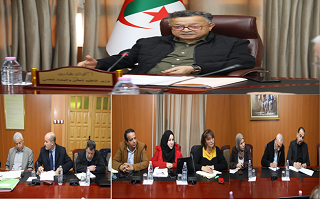
The Minister of Higher Education and Scientific Research, Mr. Kamel Baddari, met today, February 8, 2025, at the Ministry’s headquarters, with the Directors of the Research Centre in Semi-conductors Technology for Energetic (CRTSE), and the Research Centre in Industrial Technologies of the “Martyr Mohammed Abassi”, along with the research project managers of both centres.
In the course of the meeting, the Minister assessed the progress rate of various strategic research projects of the centres and stressed the significance of valorizing research and converting it into economic projects that generate revenue.
Mr. Kamel Baddari inaugurates the Studies and Achievements Company in Renewable Energies
ministerial activities
Mr. Kamel Baddari inaugurates the Studies and Achievements Company in Renewable Energies

On 6 February 2025, Mr. Kamel Baddari, the Minister of Higher Education and Scientific Research, along with Mr. Noureddine Yassaa, the Secretary of State to the Minister of Energy, in charge of Renewable Energies, inaugurated the Study and Achievements Company in Renewable Energies (ER2), within the Renewable Energies Development Centre. This event also marked the launch of the Photovoltaic measure and Wind turbine Prototyping technological platform, both unique in Africa.
This inauguration is part of the initiative aiming to “progressive evolution of scientific research towards the 4.0 generation”. The newly established facilities are designed to support innovation and strengthen national competences in renewable energy by promoting the development and application of modern technologies in energy projects.
The Minister of Higher Education launches two new digital platforms “HACKATHON” and “BAHTH”
activités ministérielles
The Minister of Higher Education launches two new digital platforms “HACKATHON” and “BAHTH”
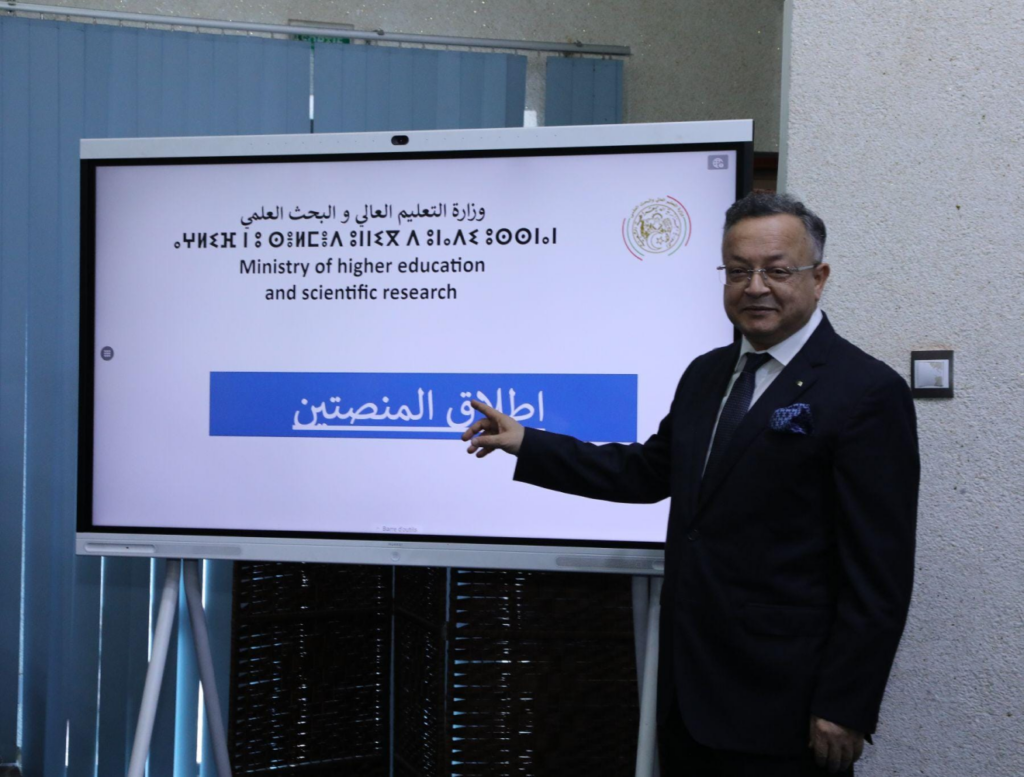
On Tuesday 4th, February 2025, Mr. Kamel Baddari, the Minister of Higher Education and Scientific Research, presided over the launch of two digital platforms designed to strengthen the relationship between the university and its socio-economic environment through the development of pedagogical innovation and the showcasing of research products.
The minister explained that these two platforms will be added to the 60 previously launched, bringing the total number of digital platforms through which higher education offers its services to 62.
On this occasion, the Minister confirmed that their aim is to improve the connection and cooperation between university institutions and their socio-economic partners by “strengthening the engagement between the two parties and exploiting the means provided by technology.”Â
The first platform, “Algerian Smart Hackathon”, allows economic and social partners to submit their questions, which are then studied by researchers and students in order to develop innovative solutions. After being evaluated by experts, these solutions are discussed with economic and social partners to select the most suitable proposal.
Regarding the “Bahth” platform, the Minister added that it is serves as a digital space showcasing significant research products from the sector, including the presentation of ready-to-use prototypes, and notable inventions, “to enable socio-economic enterprises to benefit from these innovations to enhance their performance.”
Ministerial meetings
ministerial activities
Ministerial meetings
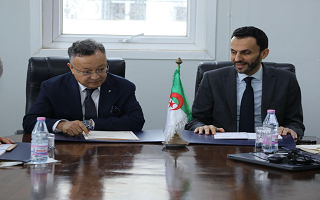
On 3 February, 2025, Mr. Kamel Baddari, the Minister of Higher Education and Scientific Research, convened with Mr. Noureddine Ouadah, the Minister of Knowledge Economy, Start-ups and Micro-enterprises, at the headquarters of the latter, in the presence of officials from both ministries.
The meeting focused on continuing and strengtheningthe and consolidating the partnership between the two sectors, in order to foster a new generation of innovative entrepreneurs and wealth-creators. The objective is to support the creation of 20,000 start-ups and economic enterprises, thereby promoting the development of a dynamic and sustainable entrepreneurial ecosystem.
Minister’s meetings
ministerial activities
Minister’s meetings
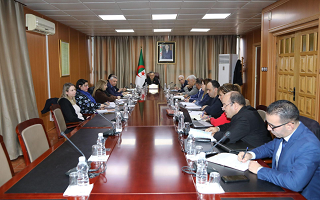
On the evening of February 2nd, 2025, Mr Kamel Baddari, the Minister of Higher Education and Scientific Research, met at the Ministry’s headquarters the Director General of Scientific Research Technological Development, along with the directorate’s executives, and officials in charge of the major strategic research projects, in the presence of senior officials from the central administration.
The minister emphasized the importance of meeting deadlines to ensure the monitoring and implementation of major projects, with a view to optimizing the efficiency of scientific research and maximizing its benefits for society.

